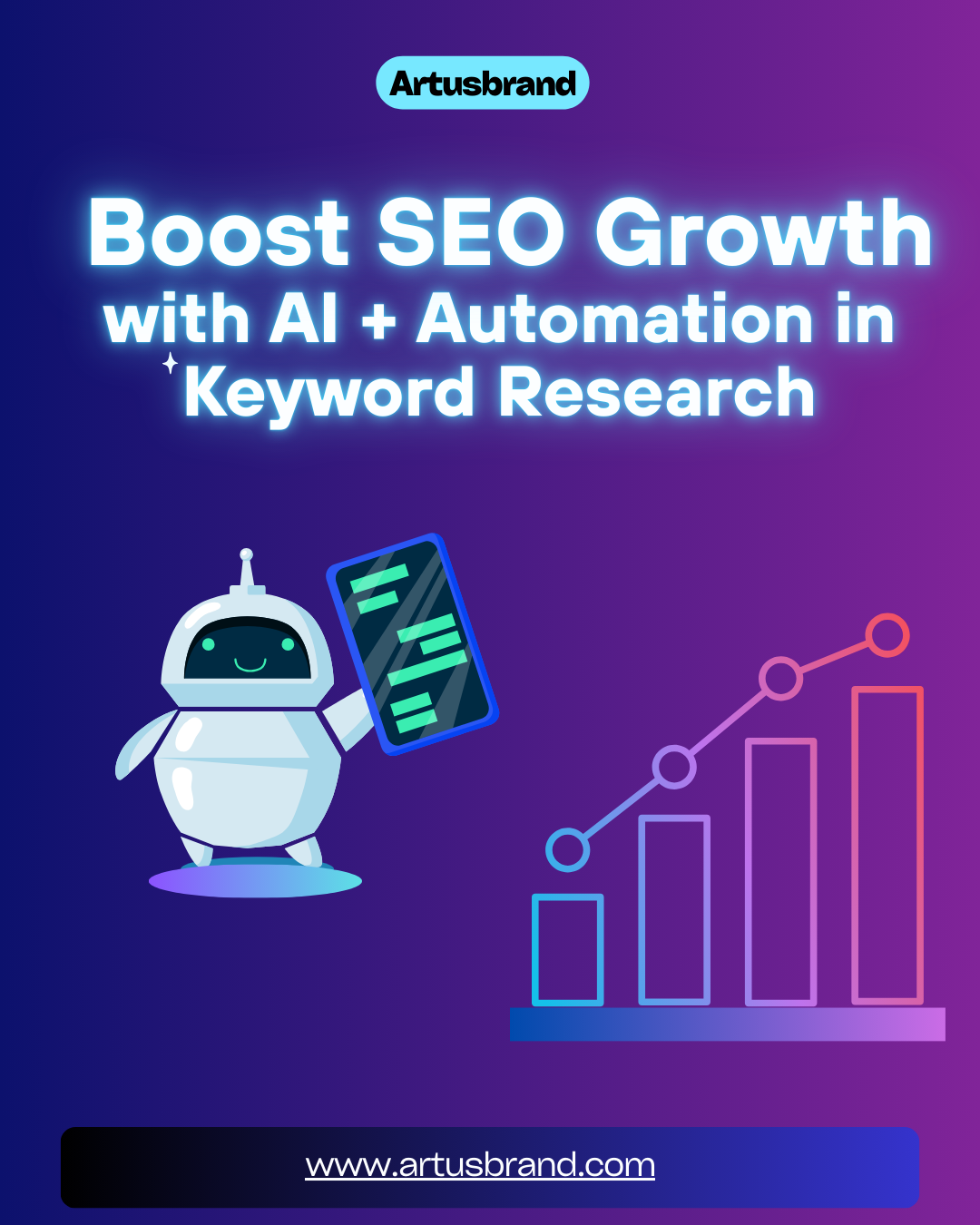Table of Contents
- Why is Keyword Research Important in Digital Marketing
- Why Keyword Research Still Matters
- 1. Use AI-Powered Keyword Discovery Tools
- 2. Automate Competitor Keyword Analysis
- 3. Leverage AI for Search Intent Matching
- 4. Automate Long-Tail Keyword Generation
- 5. Use Predictive Analytics for Trending Keywords
- 6. Automate Keyword Clustering and Topic Modeling
- 7. Automate Content Optimization with AI
- Bonus: Integrate AI with Voice Search Optimization
- Conclusion
Keyword research has always been the backbone of SEO. Without the right keywords, even the best content will struggle to rank. Traditional methods are no longer enough in today’s competitive and fast-changing digital world. As search engines evolve and user behavior becomes more complex, marketers need smarter, faster, and more data-driven solutions to stay ahead.
Before diving into the strategies, it is crucial to understand why keyword research is important in digital marketing and why it still matters even in the era of AI. Keywords are the digital bridges that connect businesses to their ideal audience. They improve content relevance, guide strategic content creation, and maximize ROI. Even with AI and advanced algorithms shaping search, keywords remain the core signals linking user queries to valuable content.
In this blog, we will explore 7 proven keyword research strategies using AI and automation to drive explosive SEO growth and elevate your search rankings.
Why is Keyword Research Important in Digital Marketing
Keyword research connects businesses with the right audience at the right time. It is the foundation of every successful SEO campaign because it helps brands understand what their customers are actively searching for. By identifying these terms and phrases, businesses can:
- Drive targeted and qualified traffic to their website
- Improve content relevance and engagement
- Maximize return on investment (ROI) from marketing campaigns
- Build long-term SEO authority and brand visibility
- Align paid campaigns with organic strategies for better cost-efficiency
Well-planned keyword research ensures that every piece of content you publish is strategically positioned to meet audience demand and drive meaningful results.
Why Keyword Research Still Matters
Some marketers assume that with AI and advanced search algorithms, keyword research is becoming obsolete. In reality, it has become even more essential. Keywords are still the primary signals that link user queries to content. They:
- Reveal the searcher’s intent, whether informational, commercial, or transactional
- Guide content creation strategies that align with what search engines expect
- Strengthen competitive advantage by uncovering hidden market opportunities
AI has not replaced keyword research; instead, it has transformed it into a faster, smarter, and more predictive process. Embracing AI-powered keyword strategies allows businesses to adapt quickly to algorithm updates and stay ahead of their competitors.
1. Use AI-Powered Keyword Discovery Tools
Traditional keyword tools like Google Keyword Planner are useful, but they often return generic results. AI-powered keyword discovery tools go a step further by using machine learning to analyze massive datasets and understand search behavior at a deeper level.
Platforms such as SEMrush Keyword Magic Tool, Ahrefs, Surfer SEO, and Ubersuggest with AI integration offer advanced capabilities:
- Analyze search intent more effectively to find high-converting keywords
- Provide semantic keyword clusters with related phrases people also search for
- Predict upcoming keyword trends through AI-driven forecasting
Example: Instead of simply suggesting “digital marketing agency,” AI-powered tools can uncover a more targeted keyword like “affordable digital marketing services for startups.” This long-tail keyword carries stronger purchase intent and lower competition.
These tools save time while delivering high-impact keyword opportunities that can directly improve your ranking potential.
2. Automate Competitor Keyword Analysis
Monitoring competitors is one of the smartest ways to uncover keyword opportunities you may be missing. Doing this manually takes time, but AI and automation make it seamless and continuous.
Tools like SpyFu, SimilarWeb, and SEMrush can:
- Automatically track which keywords your competitors rank for
- Identify content gaps, showing keywords they rank for but you do not
- Send alerts when competitors gain or lose rankings
By automating competitor keyword analysis, you can respond in real time and consistently stay ahead. Instead of reacting late, you can proactively adjust your SEO strategy to fill keyword gaps and capture market share.
3. Leverage AI for Search Intent Matching
Google’s algorithms now prioritize search intent over simple keyword matching. It is crucial to know whether users are looking for information, making a purchase, or comparing options. AI tools such as Clearscope, MarketMuse, and Surfer SEO specialize in analyzing search intent with precision.
These platforms can:
- Classify keywords into informational, navigational, commercial, or transactional categories
- Suggest content outlines and structures that align with what ranks well
- Improve engagement and reduce bounce rates by matching user expectations
Example: For the keyword “best SEO tools,” AI might recommend creating a comparison-based listicle blog, since that format consistently performs well for similar queries.
This ensures your content is not just keyword-rich but also intent-aligned, which significantly boosts ranking potential.
4. Automate Long-Tail Keyword Generation
Long-tail keywords often have lower competition and higher conversion rates, but manually generating them is time-consuming. AI automation can produce hundreds of long-tail keyword ideas in minutes.
Tools like ChatGPT with SEO plugins, AnswerThePublic, and KeywordTool.io use AI to:
- Brainstorm niche keyword variations that reflect real user questions
- Pull long-tail data from platforms like Google Autocomplete, YouTube, and Amazon
- Turn audience pain points into keyword suggestions
Examples of AI-generated long-tail keywords:
- “best AI keyword research tools for bloggers”
- “keyword research automation tips for SEO beginners”
- “how AI helps keyword clustering”
This strategy ensures you capture targeted search traffic from users who are closer to making a decision or purchase.
5. Use Predictive Analytics for Trending Keywords
One of the most powerful benefits of AI is its ability to forecast future trends. Instead of chasing what is already popular, predictive analytics allows you to rank for keywords before your competitors even discover them.
Tools like Google Trends combined with AI-driven SEO tools, BuzzSumo, and social listening platforms can:
- Forecast emerging keyword opportunities before they peak
- Analyze seasonal search behaviors and recurring trends
- Identify viral topics from social media chatter
Example: Before “voice search SEO” became a widely searched term, predictive analytics tools had already flagged it as a rising trend. By adopting predictive keyword strategies early, you position your content to rank before competition catches up.
This future-focused approach gives your SEO strategy a competitive edge and helps establish your brand as an industry leader.
6. Automate Keyword Clustering and Topic Modeling
Keyword clustering involves grouping related keywords together to build comprehensive, topic-focused content. Doing this manually is time-intensive, but AI automates it instantly.
Tools like ClusterAI, Keyword Insights, and Surfer SEO can:
- Group keywords based on semantic relevance and search intent
- Enable a single blog post to rank for dozens of related keywords
- Help build strong topic authority, which is crucial for Google’s E-E-A-T (Experience, Expertise, Authoritativeness, and Trustworthiness) signals
Example: A cluster for “email marketing” could include keywords like:
- “email marketing automation tools”
- “best time to send emails”
- “AI in email personalization”
Creating one well-structured article that targets all these keywords increases your chance of dominating search results for an entire topic rather than just one term.
7. Automate Content Optimization with AI
Keyword research does not end once you discover keywords. The next step is to optimize your content around them, and AI automation tools make this process efficient and accurate.
Platforms such as Frase, Surfer SEO, and Clearscope can:
- Suggest how often to use each keyword naturally in your content
- Highlight LSI (Latent Semantic Indexing) keywords that improve rankings
- Generate optimized meta titles and descriptions to boost click-through rates
Example: Instead of keyword stuffing, AI might recommend incorporating related phrases like “AI keyword tools” or “SEO automation strategies” to build stronger topical authority.
This ensures your content is both user-friendly and algorithm-friendly, improving its ability to rank and drive conversions.
Bonus: Integrate AI with Voice Search Optimization
With the rise of smart speakers and virtual assistants, voice search optimization is becoming increasingly important. People use conversational long-tail keywords when speaking compared to typing.
Example typed keyword: “best SEO tools 2025”
Example voice search keyword: “What are the best SEO tools for small businesses in 2025”
AI-powered tools can help you identify and target these spoken queries, ensuring your keyword strategy evolves alongside how people search.
Conclusion
Keyword research is no longer just about collecting a list of high-volume terms. In the digital world of 2025 and beyond, AI and automation will define how businesses discover, analyze, and optimize keywords.
By implementing these seven proven strategies—from AI-powered discovery and competitor analysis to predictive analytics, clustering, and content optimization—you can save time, stay ahead of the competition, and unlock explosive SEO growth.
The earlier you embrace AI-driven keyword research, the faster you will achieve sustainable search visibility and dominate your niche.
Share:


